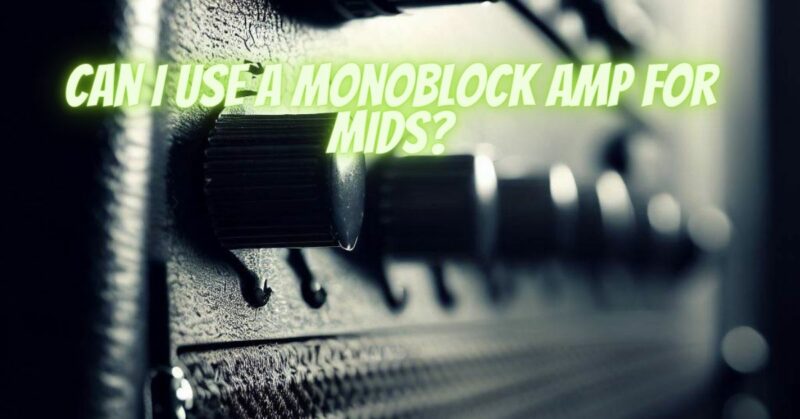The pursuit of audio excellence often leads enthusiasts to explore unconventional techniques that challenge traditional norms. A question that frequently arises is whether a monoblock amplifier, typically associated with subwoofers, can effectively power midrange speakers. This curious approach has garnered attention and sparked discussions within the audio community. In this article, we’ll delve into the possibilities, advantages, challenges, and scenarios where using a monoblock amp for midrange speakers can offer intriguing results.
Understanding Monoblock Amplifiers:
Monoblock amplifiers are specialized for driving a single channel or speaker. They are commonly used to power subwoofers due to their ability to deliver high power output and handle low frequencies with authority.
Can Monoblock Amps Handle Midrange Speakers?
The consideration of using monoblock amplifiers for midrange speakers involves several factors that shape the outcome:
- Power Delivery: Monoblock amplifiers are engineered to provide significant power output, which can be advantageous when driving midrange speakers. These speakers demand power to reproduce clear and impactful mid frequencies.
- Frequency Response: Midrange speakers cover a crucial portion of the audio spectrum, handling frequencies that bridge the gap between lows and highs. The amplifier’s frequency response must align with the requirements of midrange frequencies.
- Crossover and Filtering: Midrange speakers require precise crossover points and filtering to ensure accurate sound reproduction. Monoblock amplifiers might lack the specialized crossover features necessary for optimal midrange performance.
Advantages of Using a Monoblock Amp for Midrange Speakers:
- Power and Clarity: If a monoblock amplifier can deliver adequate power across the midrange frequency spectrum, it can provide clear and powerful mid frequencies, enhancing the overall sonic experience.
- Dedicated Channel: Using a monoblock amp for midrange speakers allocates an entire amplifier channel for this critical frequency range. This approach reduces the risk of distortion due to channel sharing and improves channel separation.
Challenges and Considerations:
- Frequency Response: While monoblock amplifiers can deliver power, their frequency response might not be tailored to midrange frequencies, potentially leading to sonic imbalances.
- Sound Quality: Midrange frequencies require precision and clarity to ensure accurate reproduction of vocals and instruments. Mono amplifiers, optimized for subwoofers, might not provide the same level of detail and fidelity.
- Crossover and Equalization: Specialized features such as adjustable crossover points and equalization are essential for achieving balanced and accurate midrange performance. Monoblock amplifiers might lack these features.
Ideal Application Scenarios:
- Enhancing Midrange Presence: Using a monoblock amplifier for midrange speakers might enhance the presence and clarity of vocals and instrumentals, particularly in installations where mid frequencies need emphasis.
- Three-Way Systems: In systems with separate drivers for bass, midrange, and highs, using a monoblock amplifier to power the dedicated midrange driver could offer advantages in power and channel separation.
Using a monoblock amplifier for midrange speakers is a non-traditional approach that requires a thorough understanding of power delivery, frequency response, and desired sound quality. While monoblock amplifiers excel in delivering power, challenges related to frequency response and tonal accuracy must be addressed. Ultimately, the decision should be based on your specific audio preferences, system design, and the sonic characteristics you aspire to achieve in your audio setup. By exploring new frontiers and creatively adapting technologies, you may uncover a unique sonic signature that resonates with your auditory sensibilities.

